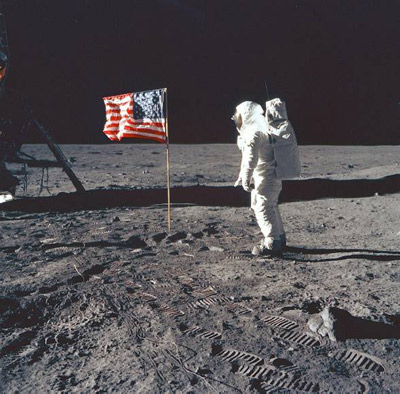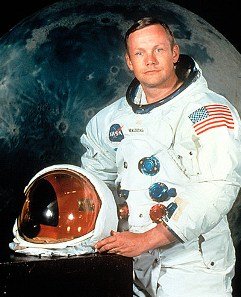August 25, 2012, - 11:21 pm
Neil Armstrong RIP: Great American Hero Who Lived to See US Space Program Die
Can’t let the day go by without noting the death of a truly great American, astronaut Neil Armstrong, the first man on the Moon, who patriotically planted the American flag there. Not only did he serve America as a Naval officer in the Korean War, but he was additionally a hero to countless millions. And not just because he walked first on the moon in July 1969 and so eloquently said, “That’s one small step for man, one giant leap for mankind.” He was brave and courageous like his fellow astronaut pioneers of the day because the astronauts did not know what fate awaited them in landing on the Moon and setting foot on it. And yet they risked their lives to reach the Moon out of a sense of patriotism and duty to America.



Earlier during his career, he could have died due to a malfunction during his Gemini 8. During those early days of the Space program, we didn’t know what kind of illnesses or other disasters could befall our men in space. As the first human on the Moon, Armstrong was a hero not just to Americans, but also to the world. We beat the Soviets in getting him on the Moon, but we won the hearts of the world (if ever so briefly) by doing so. He also inspired many American kids to go into science, an area in which we are now behind. Then, we were number one in getting to space. Now, we are number one (or close to it) in not being able to add or divide. And we are number one in viewership of “Kardashian” and “Teen Mom” reality shows. Neil Armstrong lived to see that decline.
As I wrote in my 2009 column on the 40th anniversary of the Armstrong’s historic flight to the Moon, “America Failed to Advance in Space in 40 Years Since Apollo 11: Real Science & Imagination Replaced by Junk“:
Through our own fault, through the undying devotion to pop culture and lackluster education, we’ve become ignorant. And in this dumbing down, we’ve given up our fascination with the endless possibilities and freedom of real science–space exploration, for the a dangerous obsession and endless slavery to the neuroses of fake science–”global warming,” “climate change,” the “green movement,” etc.
Without a limitless vision and imagination on our own part and that of our government, there will come a day–and in many ways, we are at that day–in which Americans will no longer stand for funding a program whose modern achievements are nebulous. More and more of our support will, unfortunately, go to junk science.
And that’s why something new, something great, is needed in the U.S. Space Program. Something beyond eating packaged freeze dried ice cream for sale at the Smithsonian Air and Space Museum.
After his career with NASA was over, the Apollo 11 Commander was largely a hermit. I noted this in my review of “In the Shadow of the Moon,” a must-see (FOUR REAGANS), terrific documentary about America’s race to–and achievement–in putting a man on the Moon (buy your copy of “In the Shadow of the Moon” here to support this site). The planning and technology America built in preparation for his historic trip put us about 50 years ahead of where we would have been now, in terms of technology, according to Buzz Aldrin, Armstrong’s crew mate and the second man on the Moon. The computers, the internet, and most other “smart” inventions we have today in technology have some root in what we produced in order to reach the Moon, he said in the movie. And even though Armstrong did not give interviews and stopped signing autographs (he did not want them to be sold for a lot of money), I think Aldrin spoke for Armstrong when he gave some insight into their historic lunar landing. He felt guilty for not going to Vietnam because of his involvement in NASA.
Those [who served in Vietnam] were my guys. That was my war. I should have been there. I always felt bad about that.
Of his behavior after landing on the moon:
From that day on, I was always extra careful about what I did, because I always knew people would be watching.
Sadly, Neil Armstrong lived to see the end of the U.S. space program for all intents and purposes, and, while he was otherwise silent in his post-NASA life, he spoke out vocally in opposition to that sad development. We are no longer going to the Moon. There is no innovation. And for the last couple of decades we’ve been sending up meaningless space shuttle missions that don’t go anywhere important. We’ve gone from Armstrong saying, “That’s one small step for man, one giant leap for mankind,” to Ronald Reagan giving a spot on the Space Shuttle to an unqualified Saudi Prince (at George H. W. Bush’s and Romney adviser James Baker’s insistence) to Barack Obama severely curtailing the space program and having his NASA chief, Charles Bolden, Jr., tell Al-Jazeera that the new goal of his agency is Islamic outreach. Huh?
Sadly, for some people, including Whoopi Goldberg, there is still the bizarre conspiracy theory “thinking” of Moon Landing Truthers, who don’t think Neil Armstrong’s landing on the Moon ever happened. But like those in “In the Shadow of the Moon” said, “We’ve been to the moon nine times. I mean, if we faked it, why did we fake it 9 times?”
Exactly. Even though I was born just before Neil Armstrong’s historic feat, I’ve always been excited and inspired by his lunar landing. In my rare spare time over the years, I make crafts (especially jewelry) out of junk I find at resale shops and flea markets and I made these bangle bracelets, posted above and below, depicting Neil Armstrong’s heroic achievement.

Hopefully some day, we’ll have a President who is inspired far beyond that, inspired enough that he reinvigorates NASA and once again sends astronauts back to the Moon and beyond.
Neil Armstrong, a Great American, Rest In Peace.
Tags: Apollo 11, astronaut Neil Armstrong, astronauts, Buzz Aldrin, Charles Bolden Jr., first man on the moon, man on the moon, Moon, NASA, Neil Armstrong, Neil Armstrong RIP, space, space race



I keep thinking that because the government runs the space program, we’re not going anywhere. My own view is that if we send humans to Mars, we send them one way and they go there for the same people went to the New World.
Its in our human nature to thrive by exploring new horizons. And our sun, now a middle-aged star, won’t last in its current form on the main sequence forever, so to preserve human life from extinction, its inevitable we’ll have to find new worlds to settle on, both in our own solar system and beyond.
Neil Armstrong would have liked to see it. Sadly, he is no longer with us and we can only hope his descendants will be worth of his legacy. A modest, unassuming man who showed us what mankind can accomplish when it has the determination to achieve the seemingly impossible.
We no longer send men to the moon but in the future we must send out colonists! May he RIP.
NormanF on August 26, 2012 at 1:47 am